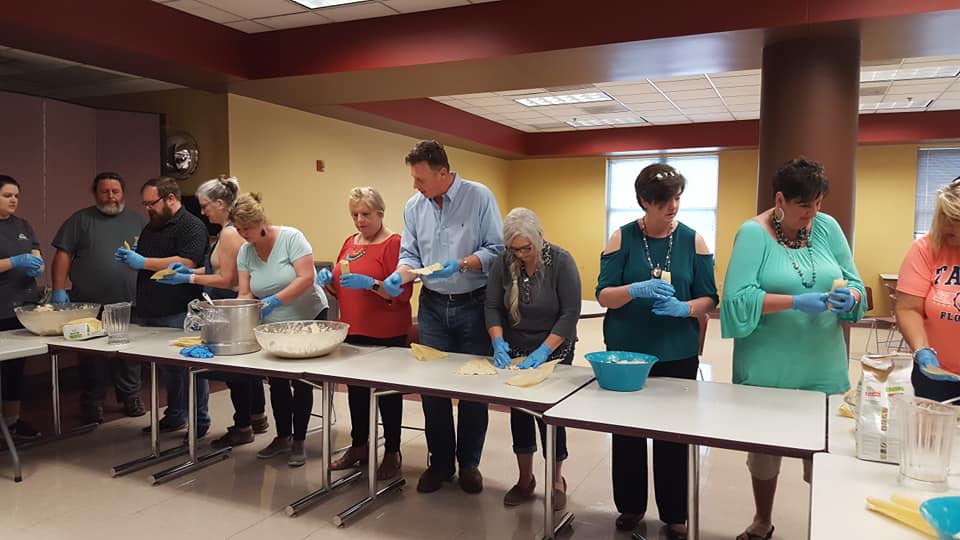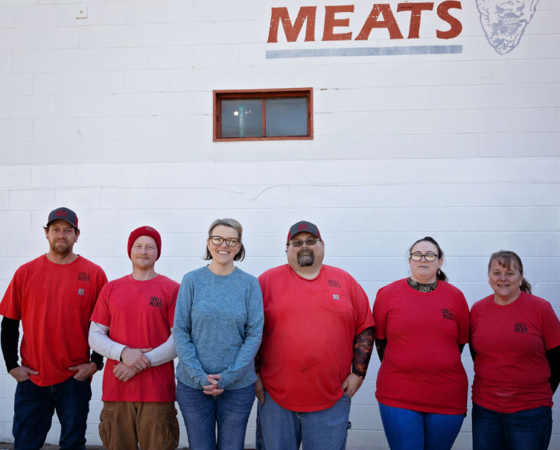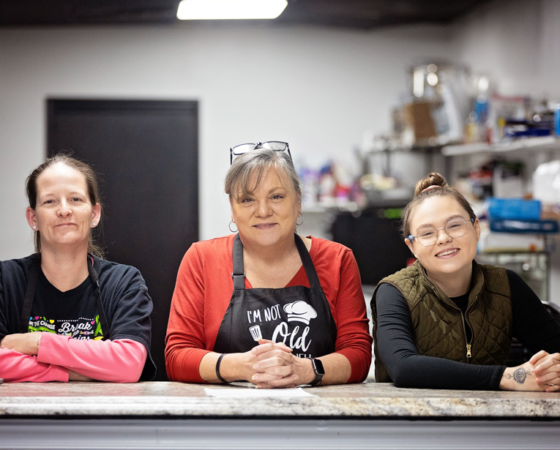“A Seat at the Table” is a series of community dinners that bring people together in Hazard, Kentucky, to share meals and lives. Each dinner has a theme or topic and intentionally focuses on communities that have often been marginalized in Perry County. Topics have included economic development, LGBTQ history and rights, cultural diversity, and more.
The very first Seat at the Table was inspired by the Joy Harjo poem “Perhaps the World Ends Here.” It’s a lovely reminder that around the table, our differences become less important.
Some of the dinners include heritage cooking classes prior to the evening feast. This year’s series, funded by a grant from the Central Appalachian Network, kicked off on May 1 with tamale making as a way to celebrate the similarity in foodways and cultures between Mexico and Appalachia.
Mexican and Appalachia foodways both have a large reliance on corn and beans, closely held traditional recipes, and meals cooked by groups of people clustered around a table. The artist collective Cornbread & Tortillas performed in Hazard last year, and this dinner aimed to spread the gospel of corn and unity a little farther.

Angelina Lonzano and her husband own one of the Mexican restaurants in Hazard. Her tamale-making skills have become legendary in the Hazard area.
A few days before the Seat at the Table event, Maggie Bowling of Old Homeplace Farms delivered 70 pounds of pork. After a small group of volunteers chopped the pork into small pieces, they delivered the pork and other ingredients to Angelina on a pretty piece of bottom land where her family lives in Perry County. They prepared the ingredients for the class.
“When we arrived, Jorge was tilling up his garden spot, readying it for tomato, pepper and cucumber plants. Their four adorable children were playing outside in the beautiful Kentucky spring,” Jenny Williams, who coordinates A Seat at the Table, wrote of her experience.
As we were unloading, Angelina saw a bag of what I thought was some kind of orange pasta that I’d picked up on a whim from the Supermercado when I was buying ingredients for the dinner.
‘I don’t know what it is. It’s some kind of pasta, right? You just boil it? I thought I’d try it,’ I said. Angelina burst out laughing and explained that it’s not pasta, but that you fry it and it puffs up to be crunchy. It’s chiccorrones, which I thought just meant pork rinds, but now I know they are chiccorrones de harina, a popular snack.
I felt very white and very clueless. Which is another good reason for this dinner.
More than 20 people showed up to learn how to mix masa, prepare fillings, and wrap tamales. Angelina explained the processes in Spanish, and Maggie Roll, Hazard High School’s Spanish teacher, translated. Participants made enough tamales to take home 10 each, and there were still a few hundred left for the feast.
“We created dozens and dozens of tamales, all gathered around tables, laughing and talking… Some were fat and wide and some were long and skinny, but they were all made with love. That love was evident in the way so many people stayed to help clean up, too,” Williams described.
Hazard High School students collaborated in making pozole, a rich soup made with hominy. There are three traditional styles: Pozole rojo, typically made with pork and chilies, Pozole Verde, usually made with chicken and tomatillos, and Pozole Blanco, with a more clear broth. The soup is served with mounds of cool, crunchy vegetables on top. Pozole, like a lot of recipes, doesn’t really rely on a recipe; instead, every family puts their own spin on it. They also made Tres Leches cakes and Agua Fresca. Once again, cooking as a community showed how sharing stories and work can make a rich experience.
The high schoolers took the food to Mother of Good Counsel Catholic Church, which has one of the most diverse congregations in Hazard. The large, welcoming fellowship hall was the perfect place for the dinner. Lori Helfrich, the Parish Life Director, has been working with Northfork Local Foods (organizers of A Seat at the Table) on improving food access through food pantries and other sources in the area.
The group placed question cards at each table at the event to get participants talking and thinking about stereotypes, foodways and shared cultures.
Guests moved through the food line, discussing the differences in the food, and commenting about how delicious everything smelled. Everybody who wanted them took home leftovers, and lots of people pitched in to clean up.
“The meal was joyful and delicious, a beautiful evening that reminded us how rewarding it is to share in both the preparation and eating of meals,” Williams wrote.
Finding ingredients for tamales in Hazard is something that might have been rare a few years ago. We reflected on Lora Smith’s great article about this, which appeared in Gravy, the journal of the Southern Foodways Alliance. We are grateful for diversification of foodways.
The second Seat At The Table event this year was a Juneteenth Celebration of African-American Appalachian Culture, which included a piemaking class with Mrs. Zetta Olinger and Anita Olinger Smith, two long-time community leaders. Upcoming events include a Mediterranean Dinner and a Foods of India dinner. All four events in this cycle of A Seat At The Table include heritage cooking classes and oral histories. Keep up with upcoming events and dates by finding A Seat At The Table or Northfork Local Foods on Facebook.
Learning from neighbors who are different than you is essential to building strong communities, which will help to build a strong Appalachia’s New Day.
This story was adapted from a longer version written by Jenny Williams. Find the full version here.
About: This is story #22 in the Appalachia’s New Day campaign, a new storytelling effort offered by MACED to eastern Kentucky communities. We can work with you to help identify, shape and amplify stories about businesses, programs and initiatives in your community that are helping build a new economy in eastern Kentucky. Read more stories here. Contact us or sign up here if you would like more details.





